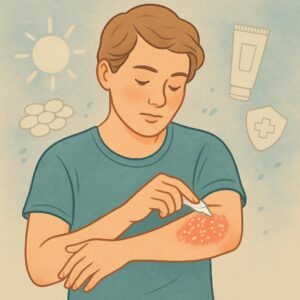Psoriasis is a chronic autoimmune skin condition where the immune system speeds up the life cycle of skin cells. This causes skin cells to build up on the surface, forming thick, scaly patches that can itch, crack, and bleed.
It’s not contagious and can range from mild to severe. Psoriasis often comes in cycles, with flare-ups followed by periods of remission.
Types of Psoriasis:
-
Plaque psoriasis – most common; raised, red patches with scales
-
Guttate psoriasis – small, drop-shaped lesions (often after infection)
-
Inverse psoriasis – smooth, red patches in skin folds (under arms, breasts, or groin)
-
Pustular psoriasis – white pustules surrounded by red skin
-
Erythrodermic psoriasis – rare, severe form with widespread redness and peeling
-
Psoriatic arthritis – joint pain and swelling along with skin symptoms

